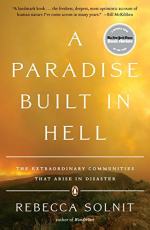|
This section contains 1,953 words (approx. 5 pages at 400 words per page) |

|
Ubiquitous Altruism
A Paradise Built in Hell argues that even in the midst of disaster, helping communities bloom. In the San Francisco earthquake of 1906, volunteers built soup kitchens almost overnight and some of them, such as the Mizpah Cafe, started serving with only one tin can and one spoon. The Cafe "was at once nothing special and a miracle, chaos and deprivation turned into order and abundance by will, empathy, and one woman's resourcefulness" (22).
Solnit also argues that disasters are "extraordinarily generative" (22), and this proved to be the case in the 1985 Mexico City earthquake as well. The earthquake radicalized the female seamstresses who saw that their bosses rescued their machinery "over the bodies and screams of their co-workers" (138). The newly political women worked together to create a powerful union that would forever look out for the interest of the front-line garment workers. In protecting these garment workers, civil society...
|
This section contains 1,953 words (approx. 5 pages at 400 words per page) |

|




